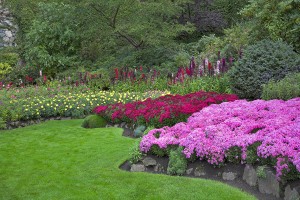We all desire lush and beautiful lawns and gardens, but sometimes feeding our plants the proper nutrients may feel like an uphill battle. Browsing the aisles of available fertilizers can be overwhelming to say the least. Organic or synthetic, do you need a specialized formulation, and what do those three numbers mean? Maybe you’ve applied a fertilizer to your lawn only to have it turn yellow! Highlands Landscape would like to offer a basic guide to fertilizers to help you decode a mysterious and necessary component of landscape care.
It’s Best to Test
Plants require six nutrients to thrive. Carbon, hydrogen, and oxygen are delivered through air and water. The remaining three are nitrogen, phosphorus, and potassium and are nutrients that are absorbed from the soil. As your plants grow they use up the available nutrients within the soil thus requiring the use of fertilizers to replenish the supply. Soil composition varies from place to place as does the soil’s pH so it is always best to use a simple soil test kit to have the best understanding of what is going on in the ground beneath your feet. Testing your soil will give you a good baseline and help you to determine which types of fertilizers will work best for your plants, trees, and lawn. While the nutrients may be present in the soil a plant can’t optimally absorb what’s there without a proper pH. A soil’s pH should be between 6.o and 7.0 for most plants.
The Numbers
Each fertilizer will have three numbers listed on the package that will tell you the proportions of each macronutrient by weight. The first number is nitrogen which provides your plant with the protein it needs to grow. Plants are programed to be greedy when it comes to nitrogen because it is hard to come by in a natural setting. A plant’s growth may become stunted as a result of too much available nitrogen because it will not have room to absorb the other nutrients it needs. The second number is phosphorus which aids in the vitality of a plant by stimulating root growth, helping set buds and flowers, and increasing seed size. The third number is potassium which improves the overall strength of the plant and helps it to resist disease. A complete fertilizer will contain some combination of all three nutrients such as 10-10-10 and an incomplete fertilizer contains only one or two macronutrients listed as 10-0-0. A completed soil test will ensure your plants receive an adequate balance of the macronutrients it needs and saves you money in the long run.
Synthetic vs. Organic
Synthetic and organic fertilizers have less to do with environmental health but instead differ in solubility and delivery to a plant. A synthetic fertilizer is made of chemically processed raw materials and made to be water-soluble. With synthetic fertilizers a plant can immediately take up the extra nutrients giving the plant a quick boost so these types of fertilizers are best applied in the spring while the ground is still cold. Synthetic fertilizers will do little to improve the overall condition of the soil and because they are water-soluble caution should be used so they don’t leach out into water systems. Organic fertilizers are not water-soluble and are meant to provide nutrients slowly over an extended period of months or years. Best applied in the fall, organic fertilizers will improve the condition of the soil by stimulating microorganisms that help the plants absorb nutrients and also by providing several micronutrients also required for optimal plant health.
We hope this basic guide to fertilizers will help you achieve the healthy lawns and gardens you deserve. We would also like to take the opportunity to remind you that Highlands Landscape offers comprehensive lawn fertilization programs that will guarantee you have the best lawn on the block!
If you’d like to schedule a free lawn and yard consultation we’re happy to provide you with one where we can walk through your property with you and talk about your lawn and yard needs.
As always, we are only a phone call away at (781) 431-2338, or you can reach us direct through our website.


Sorry, comments are closed for this post.